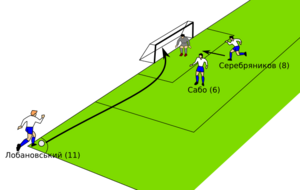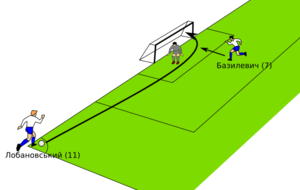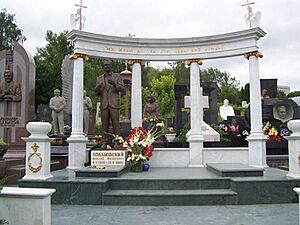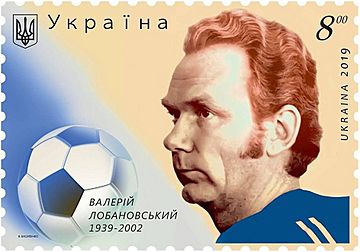Valeriy Lobanovskyi facts for kids
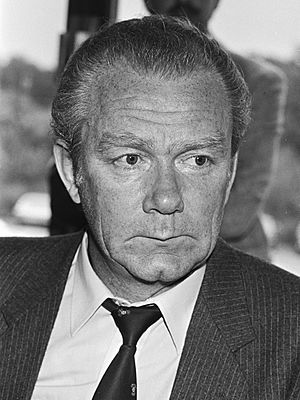
Lobanovskyi in 1985
|
||||||||||||||||
| Personal information | ||||||||||||||||
|---|---|---|---|---|---|---|---|---|---|---|---|---|---|---|---|---|
| Full name | Valeriy Vasylyovych Lobanovskyi | |||||||||||||||
| Date of birth | 6 January 1939 | |||||||||||||||
| Place of birth | Kiev, Ukrainian SSR, Soviet Union (now Kyiv, Ukraine) | |||||||||||||||
| Date of death | 13 May 2002 (aged 63) | |||||||||||||||
| Place of death | Zaporizhzhia, Ukraine | |||||||||||||||
| Height | 1.87 m (6 ft 1+1⁄2 in) | |||||||||||||||
| Position(s) | Forward | |||||||||||||||
| Youth career | ||||||||||||||||
| 1952–1955 | Football School No. 1 | |||||||||||||||
| 1955–1956 | Football School of Youth (FShM) | |||||||||||||||
| Senior career* | ||||||||||||||||
| Years | Team | Apps | (Gls) | |||||||||||||
| 1957–1964 | Dynamo Kyiv | 144 | (42) | |||||||||||||
| 1965–1966 | Chornomorets Odesa | 59 | (15) | |||||||||||||
| 1967–1968 | Shakhtar Donetsk | 50 | (14) | |||||||||||||
| Total | 253 | (71) | ||||||||||||||
| International career | ||||||||||||||||
| 1960–1961 | Soviet Union | 2 | (0) | |||||||||||||
| Managerial career | ||||||||||||||||
| 1969–1973 | Dnipro Dnipropetrovsk | |||||||||||||||
| 1973–1982 | Dynamo Kyiv | |||||||||||||||
| 1975–1976 | Soviet Union | |||||||||||||||
| 1979 | Ukrainian SSR | |||||||||||||||
| 1982–1983 | Soviet Union | |||||||||||||||
| 1984–1990 | Dynamo Kyiv | |||||||||||||||
| 1986–1990 | Soviet Union | |||||||||||||||
| 1990–1993 | United Arab Emirates | |||||||||||||||
| 1994–1996 | Kuwait | |||||||||||||||
| 1997–2002 | Dynamo Kyiv | |||||||||||||||
| 2000–2001 | Ukraine | |||||||||||||||
|
Medal record
|
||||||||||||||||
| *Club domestic league appearances and goals | ||||||||||||||||
Valeriy Lobanovskyi (born January 6, 1939 – died May 13, 2002) was a famous Ukrainian football player and manager. He is known as one of the greatest football managers of all time. He received many top awards, including the Hero of Ukraine and the FIFA Order of Merit. In 2008, he was voted 6th in the list of the 100 Greatest Ukrainians.
Lobanovskyi is most famous for leading FC Dynamo Kyiv and the USSR national team. He made Dynamo Kyiv the best club in Soviet football in the 1970s and 1980s. They won the Soviet league eight times and the Soviet Cup six times. In 1975, his Dynamo Kyiv team was the first from the Soviet Union to win a major European trophy. They won the Cup Winners' Cup. They won it again in 1986. Under his guidance, two Dynamo players, Oleg Blokhin and Igor Belanov, won the Ballon d'Or award. With the Soviet Union national team, Lobanovskyi reached the final of Euro 1988 and won a bronze medal at the 1976 Summer Olympics.
When he returned to Dynamo Kyiv in 1997, he led them to more success. They reached the Champions League quarter-finals in 1998 and the semi-finals in 1999. His star player, Andriy Shevchenko, became one of the best players in the world. Lobanovskyi won 33 official trophies in his coaching career. He is the second most successful manager ever, after Alex Ferguson. He is also the only manager to win a major European competition twice with an Eastern European club.
Contents
Early Life and Education
Valeriy Lobanovskyi was born in Kyiv on January 6, 1939. His father worked in a factory, and his mother was a housewife. He went to school in Kyiv, which was later renamed in his honor. He studied at the Kyiv Polytechnic Institute and later at the Odesa Polytechnic Institute.
Playing Football
Lobanovskyi learned to play football at youth schools in Kyiv. At 18, he joined Dynamo Kyiv, a top Ukrainian club. He became famous for his amazing ability to curve the ball from corner kicks and free kicks. He could even score goals directly from the corner! He practiced these shots a lot, using science to understand how the ball would move. People compared him to the Brazilian player Didi.
From 1960, Lobanovskyi was a regular player for Dynamo Kyiv. In 1961, Dynamo Kyiv became the first team outside of Moscow to win the USSR title. He played two games for the national team. He left Dynamo Kyiv in 1964 after a disagreement with the coach. He then played for Chornomorets Odesa and Shakhtar Donetsk. He stopped playing football at age 29, having scored 71 goals in 253 games.
Coaching Career
Starting at Dnipro Dnipropetrovsk (1968–1973)
A year after he stopped playing, Lobanovskyi became the manager of FC Dnipro Dnipropetrovsk in 1968. He quickly helped the team improve. In 1971, Dnipro won the Soviet First League and moved up to the top league.
Leading Dynamo Kyiv and Soviet Union (1973–1983)
Lobanovskyi returned to his old club, Dynamo Kyiv, in 1973. He worked with his former teammate, Oleh Bazylevych. They used a scientific approach to training, working with a scientist named Anatoly Zelentsov. They focused on players being able to play different roles on the field.
In 1975, Dynamo Kyiv made history by winning the European Cup Winners' Cup. They were the first Soviet club to win a major European trophy. They then beat Bayern Munich, a very strong German team, to win the European Super Cup. Oleg Blokhin, a Dynamo player, won the Ballon d'Or that year. Lobanovskyi and Bazylevych were named "World Sports Coach of the Year".
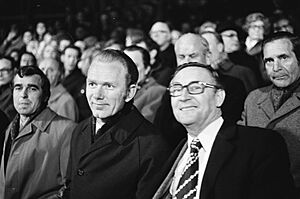
Lobanovskyi also managed the Soviet national team. In 1976, his team won a bronze medal at the Summer Olympic Games. After some challenges, Lobanovskyi continued to lead Dynamo Kyiv to more league titles in 1977, 1980, and 1981. He left Dynamo in 1982 to focus on the Soviet national team again, but was later removed from that role.
Return to Dynamo Kyiv (1984–1990)
Lobanovskyi came back to Dynamo Kyiv in 1984. The team was struggling, but he knew how to fix things. In 1985, they won another Soviet league title and the Soviet Cup.
In 1986, Dynamo Kyiv won their second Cup Winners' Cup. They played amazing football, beating Atletico Madrid 3–0 in the final. Many people called their style "football of the 21st century". Igor Belanov won the Ballon d'Or that year. Lobanovskyi was named European Coach of the Season.
He managed both Dynamo Kyiv and the Soviet national team again. At the 1988 European Championship, the Soviet team won silver medals. Most of the players were from Dynamo Kyiv. They reached the final but lost to the Netherlands.
After the Soviet Union changed, many top players left to play in Western Europe. Despite this, Lobanovskyi led Dynamo Kyiv to win their final Soviet league title and Cup in 1990. He then left the Soviet Union for a coaching job in the Middle East.
Coaching in the Middle East (1990–1996)
From 1990 to 1993, Lobanovskyi managed the United Arab Emirates national team. He helped them achieve their best result at the Asian Cup, finishing fourth. He then managed the Kuwait national team from 1994 to 1996, winning a bronze medal at the Asian Games.
Third Time at Dynamo Kyiv (1997–2002)
In 1997, Lobanovskyi returned to Dynamo Kyiv for the third time. The club had not been as successful in Europe recently. He quickly turned things around. In 1997, they won the CIS Cup. They also won the Ukrainian league easily.
In the 1997–98 Champions League, his team was in a tough group with FC Barcelona and Newcastle United. Dynamo Kyiv surprised everyone by beating Barcelona 3–0 at home and an amazing 4–0 away! They won their group and reached the quarter-finals.
The next season, 1998–99, Dynamo Kyiv reached the Champions League semi-finals. They beat defending champions Real Madrid in the quarter-finals. They lost to Bayern Munich in the semi-finals. Andriy Shevchenko was the top scorer in the Champions League and finished third in the 1999 Ballon d'Or award.
After Shevchenko and other key players were sold, Dynamo Kyiv still won domestic titles. Lobanovskyi won his last trophy in January 2002, the CIS Cup. He also managed the Ukraine national team from 2000 to 2001. He helped develop many young players who later formed the core of the team that reached the 2006 World Cup quarter-finals.
Health and Passing
Lobanovskyi had heart problems since 1988. In 2001, he had another heart attack and surgery. On May 7, 2002, during a game, he fainted and was taken to the hospital with a stroke. He had brain surgery but did not wake up. He passed away on May 13, 2002.
At the Champions League final two days later, a minute of silence was held in his honor. His funeral was attended by many important people, including the President of Ukraine and his former players. Thousands of people came to pay their respects. Lobanovskyi was buried at Baikove Cemetery in Kyiv.
Coaching Style and Ideas
Lobanovskyi is known for inventing a football style called "Total Football" along with Rinus Michels. He believed that all players should be able to play both offense and defense. He saw football as a system where the team's overall performance was more important than individual players.
He brought a scientific approach to football. He worked with a scientist to create detailed training plans. His teams were known for being very fit and playing with great teamwork. Many people said his teams played "football from the future".
Lobanovskyi was also a great psychologist. He understood how to motivate each player differently. He believed a coach must always keep learning and adapting. This helped him build three great teams in the 1970s, 1980s, and 1990s.
Tactics and Strategy
Lobanovskyi focused on the team as a "system." He planned everything carefully. Players had special training to improve their skills. He also planned specific tactics for each game based on the opponent.
His main idea was to make the playing area as big as possible when his team had the ball. When the opponent had the ball, he wanted to make the playing area as small as possible. This made it hard for opponents to find space.
Lobanovskyi's favorite formation was 4–1–3–2. He used two versatile strikers who could move around the field. His teams used "pressing" to win the ball back quickly. They would create more players in the area where the ball was to put pressure on opponents. When they won the ball, they would launch fast counter-attacks.
He paid close attention to set-pieces (free kicks and corners). In defense, his teams sometimes fouled opponents just outside the penalty area. This was because free kicks are easier to defend than shots during open play. In attack, they often played short passes from free kicks to surprise opponents.
Lobanovskyi's teams were very adaptable. He would make risky changes during games to win. He believed players should be able to play in more than one position. This meant his teams could still play well even if key players were injured or left the club.
Remembering Valeriy Lobanovskyi
After his death, Lobanovskyi was given the Hero of Ukraine award, the highest honor in his country. UEFA also gave him the Order of Merit in Ruby. Dynamo Kyiv's stadium was renamed the Lobanovsky Stadium in his honor. In 2003, he received the FIFA Order of Merit.
On May 11, 2003, a monument to Lobanovskyi was placed near the Dynamo Stadium. In 2003, the Valeriy Lobanovskyi Memorial Tournament was started to honor him.
After A.C. Milan won the Champions League in 2003, Andriy Shevchenko, who played for Milan and was coached by Lobanovskyi, took his medal to Lobanovskyi's grave.
Personal Life
Valeriy Lobanovskyi was born to Vasyl Mykhailovych Lobko-Lobanovsky and Oleksandra Maksymivna Boichenko. His father had a double surname, but Valeriy and his brother decided to use only "Lobanovsky" because double surnames were not common in the Soviet Union.
Lobanovskyi was married to Ada Lobanovska. They had a daughter named Svitlana. Svitlana is a language expert and owns a restaurant in Kyiv named "U metrá" (meaning "At The Metr"), which refers to one of Lobanovskyi's nicknames.
Legacy
There are streets named after Valeriy Lobanovskyi in some cities in Ukraine, including Kyiv. The Dynamo Stadium in Kyiv is also named after him.
Career Statistics as a Manager
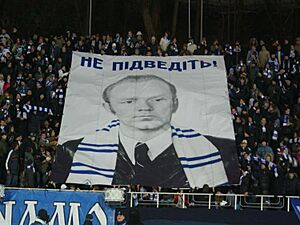
| Team | From | To | Record | ||||
|---|---|---|---|---|---|---|---|
| G | W | D | L | Win % | |||
| Dnipro Dnipropetrovsk | 1 January 1969 | 19 October 1973 | 213 | 108 | 54 | 51 | 50.7 |
| Dynamo Kyiv | 20 October 1973 | 30 September 1990 | 681 | 356 | 199 | 126 | 52.28 |
| Soviet Union | 1 April 1975 | 31 July 1976 | 19 | 11 | 4 | 4 | 57.89 |
| Ukrainian SSR | 1979 | 1979 | 7 | 5 | 1 | 1 | 71.43 |
| Soviet Union | 12 October 1982 | 14 November 1983 | 10 | 6 | 3 | 1 | 60 |
| Soviet Union | 1 June 1986 | 30 June 1990 | 48 | 25 | 12 | 11 | 52.08 |
| United Arab Emirates | 1 October 1990 | 31 December 1992 | 12 | 6 | 3 | 3 | 50 |
| Kuwait | 1 July 1994 | 31 December 1996 | 41 | 17 | 11 | 13 | 41.46 |
| Dynamo Kyiv | 1 January 1997 | 7 May 2002 | 268 | 191 | 46 | 31 | 71.27 |
| Ukraine | 1 January 2000 | 15 November 2001 | 18 | 6 | 7 | 5 | 33.33 |
| Total | 1968 | 2002 | 1317 | 731 | 340 | 246 | 55.5 |
Honors and Awards
As a Player
Dynamo Kyiv
- Soviet Top League (1): 1961
- Soviet Cup (1): 1964
As a Manager
Dnipro Dnipropetrovsk
- Soviet First League (1): 1971
Dynamo Kyiv
- Soviet Top League (8): 1974, 1975, 1977, 1980, 1981, 1985, 1986, 1990
- Soviet Cup (6): 1974, 1978, 1982, 1985, 1987, 1990
- USSR Super Cup (3): 1980, 1985, 1986
- Dynamo Games of the USSR (1): 1987
- Ukrainian National League (5): 1997, 1998, 1999, 2000, 2001
- Ukrainian Cup (3): 1998, 1999, 2000
- European Cup Winners' Cup (2): 1975, 1986
- European Super Cup (1): 1975; Runner-up: 1986
- European Cup/UEFA Champions League: Semifinalist 1977, 1987, 1999; Quarterfinalist 1976, 1982, 1983, 1998
- Commonwealth of Independent States Cup (3): 1997, 1998, 2002
Soviet Union National Team
- UEFA European Championship: Runner-up 1988
- Summer Olympic Games Bronze Medal: 1976
Ukrainian SSR Team
- Spartakiad of Peoples Bronze Medal: 1979
United Arab Emirates National Team
- AFC Asian Cup: 4th place 1992
Kuwait National Team
- Asian Games Bronze Medal: 1994
- Gulf Cup of Nations (1): 1996
Individual Awards
- Ukrainian Manager of the Season (5 times): 1996–97, 1997–98, 1998–99, 1999–00, 2001–02 (after his death)
- European Coach of the Year (3 times): 1986, 1988, 1999
- European Coach of the Season: 1985–86
- World Sports Manager of the Year: 1975
- Ranked among the Greatest Managers of All Time by France Football, World Soccer and ESPN
- France Football 8th Greatest Manager of the 20th Century
- Deutsche Presse-Agentur Greatest Eastern European Manager of the 20th Century: 1999
- Ukrainian Footballer of the Year: 1962, 1963, 1964
Orders and Other Honors
 Hero of Ukraine, Order of the State: 2002
Hero of Ukraine, Order of the State: 2002 Order of Merit (Ukraine), Class II: 1998
Order of Merit (Ukraine), Class II: 1998 Order of Merit (Ukraine), Class III: 1998
Order of Merit (Ukraine), Class III: 1998- Order of the Badge of Honour: 1971
 Order of the Red Banner of Labour: 1987
Order of the Red Banner of Labour: 1987 Medal "In Commemoration of the 1500th Anniversary of Kyiv": 1982
Medal "In Commemoration of the 1500th Anniversary of Kyiv": 1982- FIFA Order of Merit: 2002
- UEFA Order of Merit in Ruby: 2002
See also
 In Spanish: Valeri Lobanovski para niños
In Spanish: Valeri Lobanovski para niños


